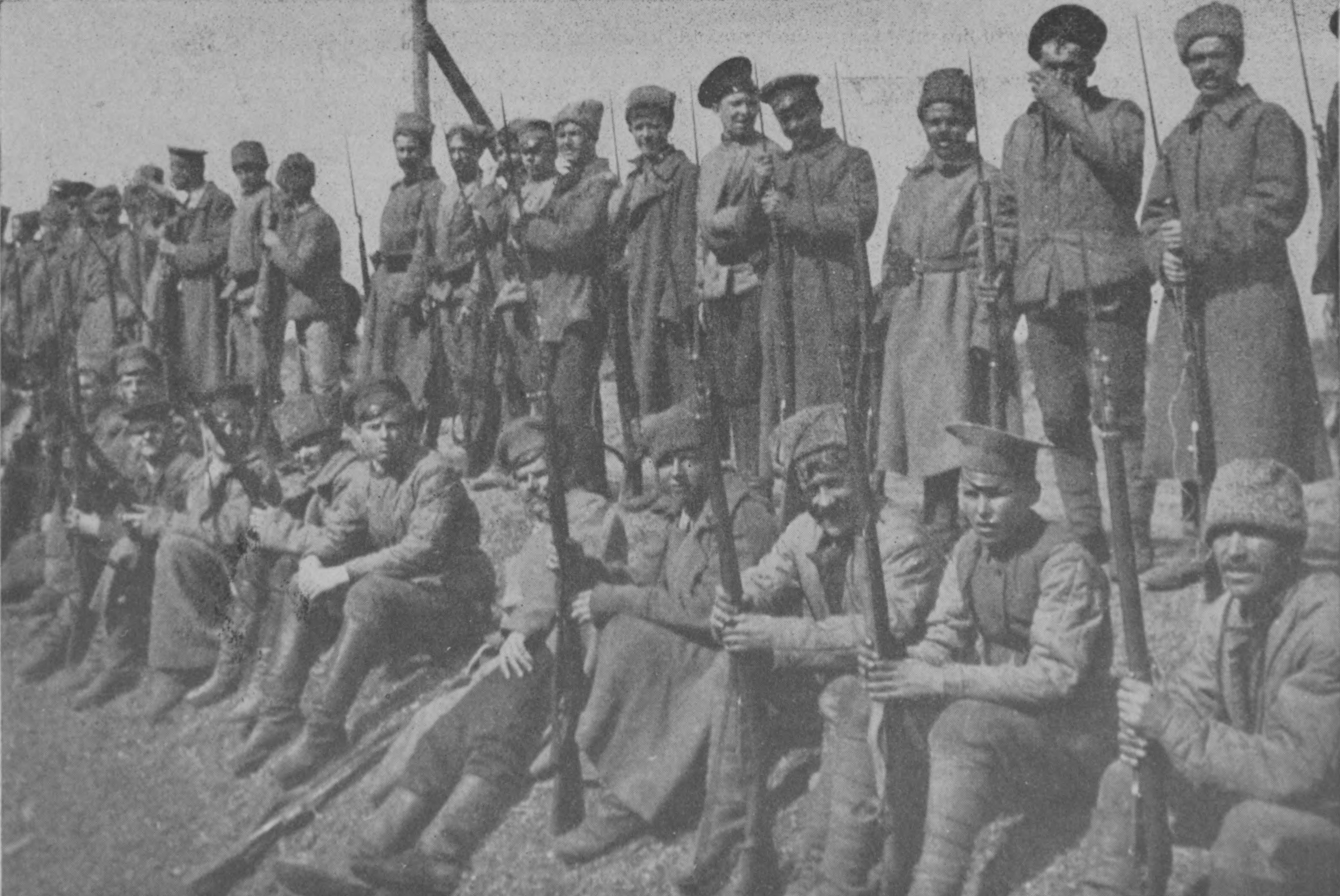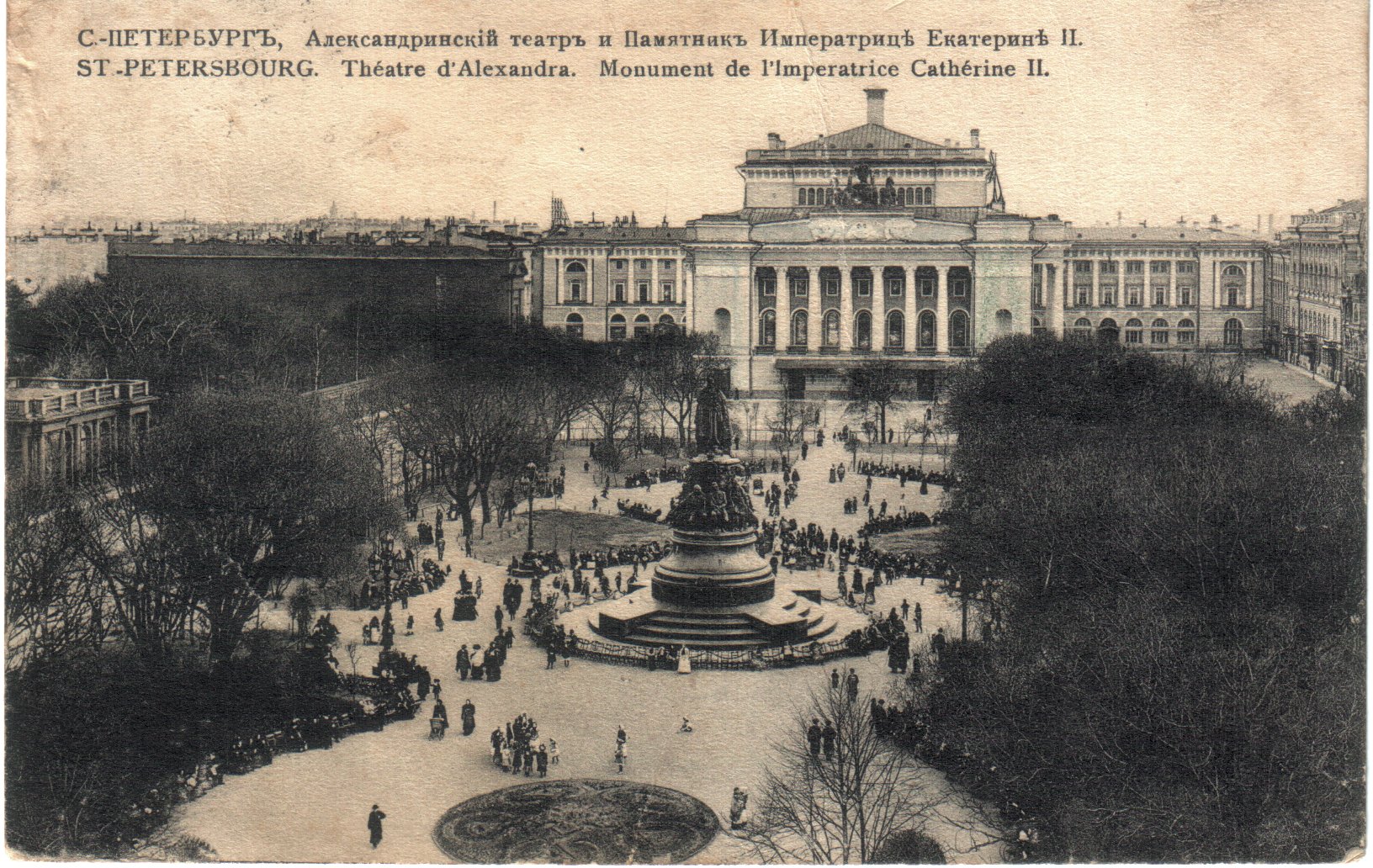|
Bolshevization Of The Soviets
The Bolshevization of the Soviets was the process of winning a majority in the Soviets by the Russian Social Democratic Labor Party (Bolsheviks) in the second half of 1917. The process was particularly active after the Kornilov Rebellion during September – October 1917 and was accompanied by the ousting from these bodies of power previously moderate socialists, primarily the Socialist Revolutionaries and Mensheviks, who dominated them. In the course of these processes, by the beginning of the October Revolution, the Bolsheviks were gaining a majority, primarily in the Soviets of Workers' and Soldiers' Deputies of large industrial cities, gaining up to 90% of the seats in the Petrograd Soviet and up to 60% in Moscow. On September 17, 1917, the Bolshevik Viktor Nogin became Chairman of the Presidium of the Moscow Soviet; on September 25, the Petrograd Soviet was headed by Leon Trotsky. Relying on their firm majority in the Petrograd Soviet, the Bolsheviks were able, despite the oppo ... [...More Info...] [...Related Items...] OR: [Wikipedia] [Google] [Baidu] |
Soviet (council)
Soviets (singular: soviet; rus, сове́т, sovét, , literally "council" in English) were Political organisation, political organizations and governmental bodies of the former Russian Empire, primarily associated with the Russian Revolution, which gave the name to the latter state of the Soviet Union. Soviets were the main form of government in the Russian Soviet Federative Socialist Republic, Russian SFSR, Makhnovshchina, Free Territory, and to a much lesser extent were active in the Russian Provisional Government. It also can mean any workers' council that is Socialism, socialist such as the Irish soviets. Soviets do not inherently need to adhere to the ideology of the later Soviet Union. Etymology "Soviet" is derived from a Russian language, Russian word meaning council, assembly, advice, harmony, or concord, uk, рада (''rada''); pl, rada; be, савет; uz, совет; kk, совет/кеңес; ka, საბჭო; az, совет; lt, taryba; ro, soviet (Mo ... [...More Info...] [...Related Items...] OR: [Wikipedia] [Google] [Baidu] |
Russian Constituent Assembly
The All Russian Constituent Assembly (Всероссийское Учредительное собрание, Vserossiyskoye Uchreditelnoye sobraniye) was a constituent assembly convened in Russia after the October Revolution of 1917. It met for 13 hours, from 4 p.m. to 5 a.m., , whereupon it was dissolved by the All-Russian Central Executive Committee, making the Third All-Russian Congress of Soviets the new governing body of Russia. Origins A democratically elected Constituent Assembly to create a Russian constitution was one of the main demands of all Russian revolutionary parties prior to the Russian Revolution of 1905. In 1906, the Tsar decided to grant basic civil liberties and hold elections for a newly created legislative body, the State Duma. However, the Duma was never authorized to write a new constitution, much less abolish the monarchy. Moreover, the Duma's powers were falling into the hands of the Constitutional Democrats and not the Marxist Socialists. The govern ... [...More Info...] [...Related Items...] OR: [Wikipedia] [Google] [Baidu] |
Political Parties Of Russia In 1917
The Political parties of Russia in 1917 were the aggregate of the main political parties and organizations that existed in Russia in 1917. Immediately after the February Revolution, the defeat of the right–wing monarchist parties and political groups takes place, the struggle between the socialist parties (Socialist Revolutionaries, Mensheviks, Bolsheviks) and liberals ( Constitutional Democrats) on the one hand, and the struggle between moderate socialists (Mensheviks, right–wing Socialist Revolutionaries, centrist Socialist Revolutionaries) and radicals (Bolsheviks, left–wing Socialist Revolutionaries, anarchists). Synopsis The February revolution sharply intensifies political life in Russia, many parties, party factions and associations are formed, the total number of which reaches 50 by November 1917. A number of small factions appeared that did not play a significant role in the events: the Menshevik Internationalists (Left Mensheviks), the Socialist Revolutionary Maxi ... [...More Info...] [...Related Items...] OR: [Wikipedia] [Google] [Baidu] |
Russian Revolution
The Russian Revolution was a period of Political revolution (Trotskyism), political and social revolution that took place in the former Russian Empire which began during the First World War. This period saw Russia abolish its monarchy and adopt a socialist form of government following two successive revolutions and a bloody civil war. The Russian Revolution can also be seen as the precursor for the other European revolutions that occurred during or in the aftermath of WWI, such as the German Revolution of 1918–1919, German Revolution of 1918. The Russian Revolution was inaugurated with the February Revolution in 1917. This first revolt focused in and around the then-capital Petrograd (now Saint Petersburg). After major military losses during the war, the Russian Army had begun to mutiny. Army leaders and high ranking officials were convinced that if Nicholas II of Russia, Tsar Nicholas II abdicated, the domestic unrest would subside. Nicholas agreed and stepped down, usher ... [...More Info...] [...Related Items...] OR: [Wikipedia] [Google] [Baidu] |
Grigori Sokolnikov
Grigori Yakovlevich Sokolnikov (born Hirsch Brilliant or Girsh Yankelevich Brilliant; 1888–1939) was a Russian Old Bolshevik revolutionary, economist, and Soviet politician. Early career Grigori Sokolnikov was born Girsh Yankelevich Brilliant in Romny on 15 August 1888, the son of a Jewish doctor employed by the railways. He moved to Moscow as a teenager and became involved in revolutionary circles alongside his friend and classmate, Nikolai Bukharin. He joined the Bolshevik faction of the Russian Social Democratic Labour Party in 1905. In 1906-07, he was based in the Sokolniki district of Moscow as a Bolshevik propagandist until autumn 1907, when mass arrests crushed the district organization, and he was detained for 18 months in solitary confinement in Butyrka prison, and sentenced to lifelong exile in Siberia. Deported in February 1909, it took four months for him to reach his assigned destination, a village called Rybnoye, on the bank of the Angara River, and six weeks ... [...More Info...] [...Related Items...] OR: [Wikipedia] [Google] [Baidu] |
Alexander Prokhorov
Alexander Mikhailovich Prokhorov (born Alexander Michael Prochoroff, russian: Алекса́ндр Миха́йлович Про́хоров; 11 July 1916 – 8 January 2002) was an Australian-born Soviet-Russian physicist known for his pioneering research on lasers and masers in the Soviet Union for which he shared the Nobel Prize in Physics in 1964 with Charles Hard Townes and Nikolay Basov. Early life Alexander Michael Prochoroff was born on 11 July 1916 at Russell Road, Peeramon, Queensland, Australia (now 322 Gadaloff Road, Butchers Creek, situated about 30 km from Atherton), to Mikhail Ivanovich Prokhorov and Maria Ivanovna (née Mikhailova), Russian revolutionaries who had emigrated from Russia to escape repression by the tsarist regime. As a child he attended Butchers Creek State School.Tablelander (newspaper) 19 July 2016 'Prokharov centenary' In 1923, after the October Revolution and the Russian Civil War, the family returned to Russia. In 1934, ... [...More Info...] [...Related Items...] OR: [Wikipedia] [Google] [Baidu] |
Great Soviet Encyclopedia
The ''Great Soviet Encyclopedia'' (GSE; ) is one of the largest Russian-language encyclopedias, published in the Soviet Union from 1926 to 1990. After 2002, the encyclopedia's data was partially included into the later ''Bolshaya rossiyskaya entsiklopediya'' (or '' Great Russian Encyclopedia'') in an updated and revised form. The GSE claimed to be "the first Marxist–Leninist general-purpose encyclopedia". Origins The idea of the ''Great Soviet Encyclopedia'' emerged in 1923 on the initiative of Otto Schmidt, a member of the Russian Academy of Sciences. In early 1924 Schmidt worked with a group which included Mikhail Pokrovsky, (rector of the Institute of Red Professors), Nikolai Meshcheryakov (Former head of the Glavit, the State Administration of Publishing Affairs), Valery Bryusov (poet), Veniamin Kagan (mathematician) and Konstantin Kuzminsky to draw up a proposal which was agreed to in April 1924. Also involved was Anatoly Lunacharsky, People's Commissar of Education ... [...More Info...] [...Related Items...] OR: [Wikipedia] [Google] [Baidu] |
Army Committees
The Army Committees (russian: Арме́йские комите́ты) sometimes called the ''Soldiers' Committees'' (russian: Солдатские комитеты)Victor Miller. Soldiers' Committees of the Russian Army in 1917. Moscow, 1974 were the highest elected political organizations in the Russian army that emerged in 1917. General information The army committees directed the activities of the military committees that arose during the February Revolution of 1917. In the troops, they performed the functions of the Soviets. They were elected in private at the general meeting of the unit after the release on March 14, 1917 of order No. 1 of the Petrograd Soviet of Workers' and Soldiers' Deputies. Army committees were given the right to manage the work of military committees of the army, to conduct investigations within the entire army area within their competence, for which "flying" detachments were created, to issue resolutions on specific issues that are not of a general na ... [...More Info...] [...Related Items...] OR: [Wikipedia] [Google] [Baidu] |
Central Committee Of The Baltic Fleet
The Central Committee of the Baltic Fleet (Tsentrobalt) russian: Центральный комитет Балтийского флота (ЦКБФ, Центробалт) was a committee for coordination of the activities of sailors' committees of the Russian Baltic Fleet. It was established on 11–13 May (28–30 April, Old Style) 1917, after the February Revolution. Its first chairman was Pavel Dybenko. In December the office of the Baltic Fleet Commander-in-Chief and his staff were abolished, and Tsentrobalt assumed the full power over the Fleet. In January 1918, the 5th convocation of Tsentrobalt was under the domination of the Anarchists. Tsentrobalt was abolished on February 13 (January 31 O.S.) 1918 due to the introduction of a new structure: Baltic Fleet Council of Commissars. '' |
Provisional Council Of The Russian Republic
Provisional Council of the Russian Republic (, (also known as Pre-parliament) was a legislative assembly of the Russian Republic. It convened at the Marinsky Palace on October 20, 1917, but was dissolved by the Bolsheviks on November, 7/8, 1917. It was headed by a presidium of five members with Nikolay Avksentiev (Social-Revolutionary) as president. History On September 19 (October 2), 1917, the Democratic Conference adopted a resolution against the creation of a government in coalition with the cadets, and the majority of the Socialist Revolutionaries and Mensheviks voted against the coalition. On September 20 (October 3), the Presidium of the Seating decided to delegate out the All-Russian Democratic Council, also the Provisional Council of the Russian Republic (Pre-Parliament), in proportion to the number of its groups and factions. He was called upon to become, before the Constituent Assembly, a representative to which the Provisional Government had report. The first meetin ... [...More Info...] [...Related Items...] OR: [Wikipedia] [Google] [Baidu] |
All-Russian Democratic Conference
300px, Presidium of the All-Russian Democratic Conference (Petrograd, Alexandrinsky Theater, September 27 – October 5, 1917) The All-Russian Democratic Conference (Democratic Conference) was a meeting of representatives of political parties and public organizations, held in Petrograd from September 27 to October 5, 1917. The outcome of the meeting was the creation of the Pre-Parliament. Background The decision to convene a Democratic Conference, as opposed to the Moscow State Conference, was taken at a joint meeting of the Central Executive Committee of the Soviets of Workers' and Soldiers' Deputies and the executive committee of the All-Russian Council of Peasant Deputies on September 3, 1917. The immediate impetus was the Rebellion of Lavr Kornilov and the collapse of the next government coalition, provoked by him; in a telegram inviting representatives of parties and public organizations to take part in the meeting, signed by the chairmen of the Central Executive Committee ... [...More Info...] [...Related Items...] OR: [Wikipedia] [Google] [Baidu] |







